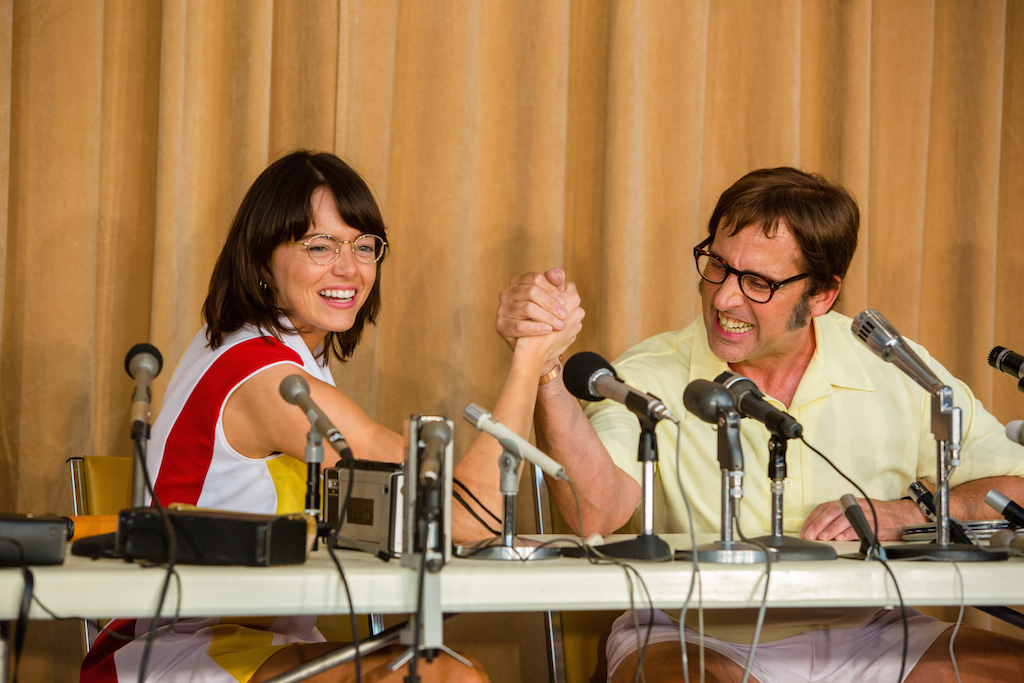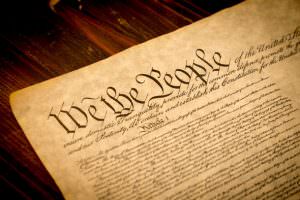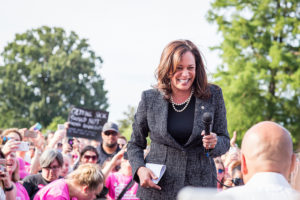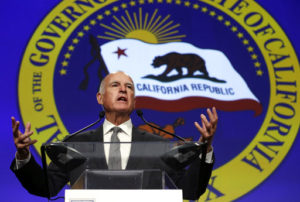Gender Equality Takes Center Court in ‘Battle of the Sexes’
The Oscar-worthy film about the Billie Jean King-Bobby Riggs 1973 tennis match speaks to issues that are sadly all too contemporary. Emma Stone and Steve Carell in "Battle of the Sexes." (Melinda Sue Gordon / Fox Searchlight)
Emma Stone and Steve Carell in "Battle of the Sexes." (Melinda Sue Gordon / Fox Searchlight)
The battle of the sexes is an ongoing one and will no doubt continue well into the future. But there are numerous skirmishes that should have been settled long ago. Equal pay is one. It’s still in the headlines today, and it was a signature issue in 1973 for Billie Jean King, portrayed by the incomparable Emma Stone in the timely and superbly crafted film “Battle of the Sexes.”
King argues with Jack Kramer (Bill Pullman), a former tennis-pro-turned-spokesman for the Association of Tournament Directors. “Men are more exciting to watch,” he tells her, despite gender-comparable television audience figures. It’s the same baseless assumption the U.S. women’s national soccer and hockey teams confronted just last year during contraction negotiations.
Nationwide, women still average 79 cents on the dollar, and even in Hollywood, where everyone’s overpaid, actors such as Jennifer Lawrence and Stone herself have spoken out about male costars agreeing to pay cuts to achieve parity.
Coming off her Oscar win for “La La Land,” Stone transforms from an ingénue to a killer on the tennis court. With awkward glasses and lumbering shyness, she inhabits King as a 29-year-old ace at the top of her game. In the era of the women’s liberation movement and in the face of Kramer’s chauvinistic obstinacy, she and her teammates form the Women’s Tennis Association under the guidance of Gladys Heldman (played by a scene-stealing Sarah Silverman). Sleeping in lousy hotels and eating in diners, they soon get an upgrade, thanks to an endorsement from Virginia Slims cigarettes, which the women are encouraged to smoke.
Meanwhile, a washed-up, 55-year-old tennis star, Bobby Riggs (Steve Carell), has been watching the split in the tennis world from his nest in the mansion of his heiress wife, Priscilla Wheelan (Elisabeth Shue). For kicks, he defies her no-gambling rule and plays matches with his friends, sometimes walking three dogs with one hand while wielding a racket in the other. In a eureka moment, he approaches King about a novelty match billed as the “Battle of the Sexes,” but she passes, feeling it would demean women’s tennis.
When Australian star Margaret Court (Jessica McNamee) becomes ranked No. 1, Riggs gets his match and humiliates her. For King, it’s the final straw. It comes at the end of a long line of slights from men, whether they are announcers who say things like, “Watch out guys, there’s no stopping this little lady!” or a real-life Howard Cosell digitally inserted alongside tennis pro Rosie Casals (played by Natalie Morales), whom he slips his arm around.
Such casual sexism is just one of many details highlighted by husband-and-wife directing duo Valerie Faris and Jonathan Dayton. Along with a creative team consisting of cinematographer Linus Sandgren, who won the Oscar for “La La Land,” art director Alexander Wei and costume designer Mary Zophres, they conjure the era in a nuanced and authentic manner that avoids cliché, as well as the stylistic overindulgence of other 1970s-set movies.
The film also treats King’s sexuality with grace. After receiving a stimulating haircut from Marilyn Barnett (Andrea Riseborough), King realizes she is attracted to women (King did not go public with her discovery until 1981). At this point, King, who has been married for roughly seven years to Larry King, tells Marilyn she’s never been with a woman before diving into a relationship artfully rendered by screenwriter Simon Beaufoy. The King-Barnett chemistry is electrified on the screen through subtext stemming from outstanding directing and performance. Because the early groundwork is so carefully laid, the later, more dramatic moments pay off with gut-felt emotion.
In the ultimate match, the stakes are higher for King than for Riggs. Sure, his image is at stake, as well as a $100,000 purse, but he’s been playing a role all along, milking it for every dime it’s worth. King, on the other hand, is an underdog who has to win. Everything she has built her name on is at stake—the Women’s Tennis Association and her own core belief in social justice, not to mention the pride of millions (the event drew 90 million viewers).
Instead of shooting the match from multiple angles and building tension through edits, Faris and Dayton shrewdly highlight key momentum shifts in the action from the perspective of a TV camera, emphasizing emotion and inner life through body language.
Beaufoy reportedly wrote the screenplay for his “Slumdog Millionaire” collaborator director Danny Boyle, who instead wound up executive-producing the film, handing it off to Faris and Dayton. The pair—best known for their 2006 Sundance hit, “Little Miss Sunshine,” also starring Carell—reteams with him here to ecstatic effect. His Riggs is the broader, buffoonish yang to Stone’s yin, but there’s a method to his madness. He doesn’t necessarily believe all the sexist things he says, but like any good carnival barker, he puts the “show back in chauvinism.”
His souring marriage registers as a minor dramatic bump. It is a consistent issue with the movie’s secondary characters, despite admirable performances by Shue as Riggs’ wife, and Austin Stowell as King’s husband, whose arc about losing his wife to another woman falls flat. Not helping is an overabundance of familiar faces in supporting roles (Chris Parnell as Riggs’ personal doctor, Alan Cumming as a designer of tennis wear) that often serve as a distraction.
But none of it matters, because the writing, directing and, most of all, the acting at the core of “Battle of the Sexes” is so fundamentally strong. Stone has carved a smart and admirable career through Hollywood, making astute choices against the odds during mainstream filmmaking’s dumbest era ever. Her first high-profile title was “Superbad” followed by “Zombieland.” Both were well-reviewed, box-office hits. Within a few years, she had a breakout in the modern teen comedy classic, “Easy A.” Subsequent choices, such as “The Amazing Spider-Man,” gave her street cred in executive suites, which she leveraged into working with a powerhouse cast in “The Help,” followed by a supporting part in best picture-winner “Birdman.”
As Billie Jean King, Stone continues the trend with gutsy commitment to character and a seamless transformation into a woman that no one would argue she was born to play. Without sermonizing, “Battle of the Sexes” speaks to issues that are sadly all too contemporary, but it does so in a way that is entertaining, thoughtful and emotionally engaging, making it a worthy entry in the Oscar race.
Your support matters…Independent journalism is under threat and overshadowed by heavily funded mainstream media.
You can help level the playing field. Become a member.
Your tax-deductible contribution keeps us digging beneath the headlines to give you thought-provoking, investigative reporting and analysis that unearths what's really happening- without compromise.
Give today to support our courageous, independent journalists.








You need to be a supporter to comment.
There are currently no responses to this article.
Be the first to respond.